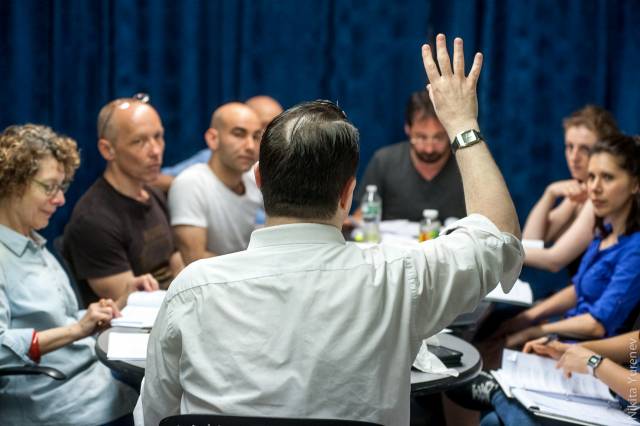

Years ago, during a heated, college-theatre class debate on the subject of risk-taking in theatre, I, with the untamed and unearned arrogance of youth, scornfully declared, “You people have no idea what it means to take risks. All this talk of emotional vulnerability being so daring is redundant. There was a time when doing theatre was a matter of life and death!”
The young me hardly knew who I was actually referring to, just parroting the words of theatre’s great artists. On Monday evening, at Theatre 80 in the East Village, I, along with a standing-room only audience, met Solomon Mikhoels (energetically and lovingly brought to life by Gera Sandler), Nina Reznik (performed breathtakingly by Yelena Shmulenson with elegant restraint, complex melancholia and a simmering fire), Binyammin Zuskin (Adam Shapiro, blending Falstaff, Bottom, Eeyore and a conflicted Sister-Wife in his sweet performance), and others who truly did risk their life for doing theatre. They each paid a painful and frightening sentence for being artists unwilling to fully succumb to Soviet censorship.
In the New Yiddish Rep’s production of David Schneider’s Making Stalin Laugh, we are submerged into the lives of the passionate actors who made up what was once considered the “greatest theatrical marvel” by Yiddish activist and critic, Nakhmen Mayzel. The company was the Moscow State Yiddish Theatre (1918-1948), or GOSET, as was its Soviet acronym. During its two-day run at Theatre 80, the play is still in early days with actors holding scripts, doing a remarkable job of making those scripts a natural extension of their characters, might I add.
Playwright David Schneider and director Allen Lewis Rickman tell this story in a way that makes the audience not just a fly on the wall, but a fly on the earlobe of the actors. We walk onstage and offstage with the actors in several plays-within-the-play. We even hear, and feel, the painful silence when their audience ignores their standard, second curtain call. We are not spared the tension or regret of all their sorrowful and incestuous affairs. We are comforted by their undying brotherly love towards each other. We are inspired by their unwavering artistic vigor.
From this point of view, GOSET seems like any other theatre company that’s ever existed anywhere in the world. That is, until the rehearsals are monitored by State Repertory Officers. We then taste the danger of being a member of GOSET. The company answers to one man ultimately and that man is no artist. This company’s true director is a man so brutal and terrorizing that as history tell us, he legally changed his name to Stalin, meaning ‘man of steel.’
Making Stalin Laugh has a far-reaching relevance today and, perhaps, always. The play deserves to be placed somewhere in the current world canon of theatre, even as it is still being flushed out. One would find it hard to dispute the play’s necessity to the history of theatre. Schneider fully shapes the characters, places them inside a nightmare, and then turns their treadmill on 7.0 with a steep incline. Not one step is taken that need not be. It is a long story, but no scene sticks out as superfluous. Perhaps some lines can be cleaned up but maybe that’s to be done in the supertitles instead.
Credit to director/producer Allen Lewis Rickman for entrusting the actors to create the environment, the mood, the set and the illusion. There are no tricks up Rickman’s sleeves, no spoon-feeding the audience a setting, no clever nothing. Rickman has pulled extremely marvelous performances out of his actors; he knows that all a play needs are really good actors who are living moment to moment through the life of the play.
I applaud the risks taken by Yiddish Rep for turning this once English-spoken play into its now multilingual version. Keep this version. However, the supertitles have sadly become the only bad actor onstage, constantly pulling undeserved focus. Supertitles in theatre is an art form to be treated delicately, prudently and most of all, with the thought of keeping the play’s tempo. Don’t let the audience read the punchline twenty or so seconds before the actor speaks the line. If this cannot be achieved, at least choose one font, or one for each character, and stick with it.
Making Stalin Laugh is a risk well taken. It is a mammoth of a play. As I heard it wisely put by my partner that night, “It is not theatre for the faint of heart.” What David Schneider has successfully done is kept a nearly century-old story relevant, captivating and still holding grains of threat. Schneider is not going to let us forget the atrocities done to our artists, nor allow us the indulgence of self-pity for not being appreciated as artists or mere humans. He is teaching us a lesson, holding a mirror up to our faces and telling us one of history’s harshest stories without ever coming across as preachy or as a know-it-all. Schneider has looked back in time, found a story worth telling, and then passed it down to our generation. This is the job of the artist. May the artist never be silenced again.